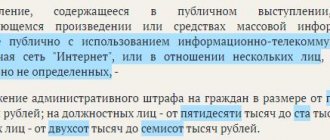The state is obliged to protect the honor and dignity of every citizen. Not only assault, but even insult is a criminal offense.
But what happens when a person insults and undermines the authority of the state itself in the person of a policeman? What is the punishment for insulting a police officer while on duty? What is the difference between swearing at a person in uniform and a simple passer-by, and can there be aggravating and mitigating circumstances for such an offense? In this article we will answer these questions.
Definition of crime
Insulting an official during execution, like any other crime, must have elements. It includes the subjective and objective sides, the object and the subject, which together determine this or that action and characterize it as an offense.
In this case, in order for the offense to be “complete” and for insult to be prosecuted, all these reasons and conditions must be “present”.
- the subject is the person who insulted the police officer;
- the subjective side is intent - revenge or some motive of the offender;
- the objective side is the honor and dignity of the law enforcement officer;
- the object is the authority of the police and local authorities in general.
The main sign of a crime is the publicity of the uttered insult and, of course, the presence of witnesses (at least one). It doesn’t matter if it was said to an employee’s face or if the insults were written on a personal blog/social media page. networks or in the media.
Based on the motive of the suspect, the court makes a verdict. Motives play an important role - they determine mitigating and aggravating circumstances.
Basic information
A police officer is a representative of authority. His insult threatens the violator with a certain punishment according to the Criminal Code. To be held accountable, it is necessary that the offense was committed in a public place, and there were other people nearby who could confirm the fact of the offense in court.
If a person insults a police officer in the absence of witnesses and/or in a non-public place (for example, in the police department), then he will face administrative liability.
Punishment for insulting a police officer
If there is a crime, there will be punishment. Article 319 of the Criminal Code of the Russian Federation provides for the following sanctions:
- a fine of up to forty thousand rubles;
- a fine in the amount of three months' salary;
- compulsory work up to 360 hours;
- correctional labor for up to 1 year.
Important! The article for insulting a police officer while on duty provides for aggravating circumstances. In this case, the convicted person can not only pay a fine, but also go to perform compulsory work.
There may be various reasons for aggravating circumstances when passing a sentence:
- the attacker is drunk and insults a government official for his own entertainment;
- does not want to comply with the police’s demands;
- interferes with the performance of direct duties of a person in uniform.
Punishment for insulting a police officer during execution under Article 319 also provides for mitigating circumstances. They can be:
- the perpetrator is detained for the first time for such a violation;
- the policeman provoked the person by his unlawful actions;
- In some cases, obscene language directed at a police officer may not have direct intent. For example, a person was so drunk that he was not aware of his actions.
The law clearly defines the social roles of officials. If a police officer was insulted while not performing his direct duties, then the punishment will be completely different.
In this case, it will be possible to prosecute the culprit only under the civil code - under Art. 5.61 Code of Administrative Offenses of the Russian Federation “Insult”. Punishment under this article provides only monetary fines, and insignificant ones when compared with Art. 319 CC.
Composition of the offense and legal regulation
Insult is a deliberate humiliation of someone's dignity, expressed in a form that is contrary to the norms of generally accepted morality. The object of insults can be people, objects of art, countries, etc. A special case is insulting a police officer as a representative of government authority.
Additionally
If a crime was found in the actions of the offender, the case of insulting a police officer will be considered in court. In this case, the subject of the offense may be recognized as a legally capable person who has reached the age of 16.
Liability for this offense is regulated by Article 319 of the Criminal Code (CC) of the Russian Federation. The crime is intentionally insulting a police officer with obscenities, unflattering comparisons, and indecent gestures. It does not matter whether the insult was committed verbally or in writing, or whether the content of the offensive message was false or true. Any insult to a police officer while on duty is criminally punishable. It is worth noting that a remark correctly made to a police officer is not an insult. For example: “You are not performing your duties correctly.” Even if this statement is not true, it is not identified as an insult.
When insulting a police officer, the object of the offense is the police officer currently authorized to protect law and order. The subject can be any capable citizen over 16 years of age. Insulting a government official is considered an offense if it was committed in front of witnesses, that is, in public. The crime is implied to be committed as soon as the insult has been expressed (written, shown). Find out more about this type of offense as public insult here.
The severity of the act is determined depending on the circumstances of the offense committed. For example, if the insult was inflicted after the police officer committed some unlawful act against the accused citizen, then the punishment will be minimal.
In what cases can punishment be avoided?
A fine for insulting a police officer is the least that awaits a convicted person. It doesn't matter who was right. Insulting an official is a delicate matter. After all, by expressing his impartial attitude towards a representative of the authorities, the culprit not only insults the honor and dignity of a person, but also undermines the authority of the system itself.
Therefore, it is unlikely that it will be possible to avoid punishment. But there are only two possible options to avoid responsibility.
- Firstly, this is an insult to a police officer in private. But in this case there will be no crime and there will be nothing to prosecute for.
- Secondly, the culprit should ask for forgiveness from the offended government official.
If the policeman considers the apology sincere and has no desire to bring the culprit to justice, then the conflict can be settled by agreement of the parties. Actually, in order not to appear in court, an apology and repentance are the only possible option for the attacker.
Tips on where to turn if the site turns out to be fraudulent.
And here are the features of bankruptcy of a municipal unitary enterprise.
Additional features and nuances
The following factors may act as mitigating circumstances:
- the offender has not previously faced administrative or criminal liability;
- the accused was provoked by unqualified actions of a government official;
- the police officer exceeded his official authority, which infuriated the offender, as a result of which he insulted an authorized person.
Aggravating circumstances are represented by the following factors:
- the person was drunk at the time of the offense;
- insults were made to the accused with the intention of having fun.
The presence of one or another factor must be confirmed by evidence.
The best course of action is to apologize and make attempts to end the case as a result of active repentance. This will avoid criminal liability, especially if the case has not yet been initiated.
Conclusion
Punishment for insulting an employee during execution includes not only fines, but also enforcement work. Moreover, it is almost impossible to avoid responsibility. This is a serious offence. Do not forget that a police officer is not just a person, but also a representative of government. By insulting him, you undermine the entire institution of power in the eyes of the public.
It is understandable that sometimes emotions can get the better of you, especially if a police officer commits misconduct. But even in this case it is worth being correct. If a government official is wrong, you can hold him accountable in a civilized manner. But if you start insulting him, you automatically become guilty. Always remember this.
Stages of investigation of an offensive offense
- The injured police officer submits a statement to the police department or writes a report to his superiors. The application (report) must contain the following information: place and time of the offense;
- Full name (if found out) of the citizen who committed it;
- description of actions that offend the dignity of a police officer;
- please punish the offender.
Arbitrage practice
The police were called to the hostel to restore order. Subsequently, one of the riot participants, being drunk, met a police officer on the street. He was in civilian clothes and was resting after work.
The attacker began to insult him, recalling the case when he and his friends were charged with sanctions for disorder in a public place. The court hearing determined not an administrative offense , but guilt in the form of criminal liability, since the insult concerned the performance of the police officer’s duties.
At the court hearing, the excited defendant, who had to repeat the same information to the judge twice, asked her a question: “Do you have sclerosis?”
Since the judge was not young, she was greatly offended by the remark. Responsibility for insulting an official arose under Article 319 of the Criminal Code of the Russian Federation.
In a medical sobering-up station, a citizen obscenely insulted a police lieutenant, a young woman. The claim for insulting a government official was rejected due to the fact that in this case only employees of the medical sobering-up center were present during the insult, and the principle of publicity was not demonstrated. In this case, the insult initially had to be qualified under Article 130 of the Criminal Code of the Russian Federation .
A government representative can act in different social roles, which determine the degree of his protection in society. In order to achieve justice and punish the offender, a representative of the government must correctly navigate the context that determines for him the protective properties of the justice system.
Features of the offense
The main feature is that insulting a police officer is a crime only when he is on duty. If he is insulted during his off hours, this cannot be considered a criminal act.
Other criteria:
- the crime is most often public, for example, during public unrest;
- he has direct and specific intent, the criminal must be motivated by something. The most common is hooliganism, a consequence of resentment, hatred, revenge or unwillingness to obey law enforcement officers;
- an insult can be voiced unconsciously, for example, by a drunk person;
- it is not always presented in person or orally, since it may be information published in the media or via the Internet.
The described crime is dangerous in that it undermines the authority of the law enforcement agencies of the country in which it was committed (Russia, Kazakhstan, Belarus, Ukraine, Germany, the USA and any other state), and threatens the honor and dignity of the individual employee.








